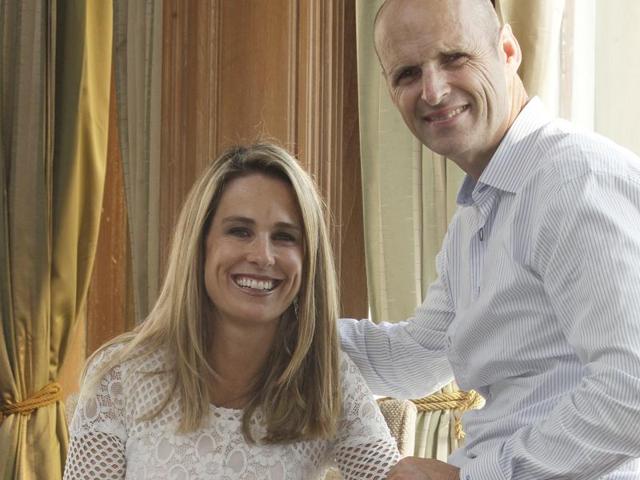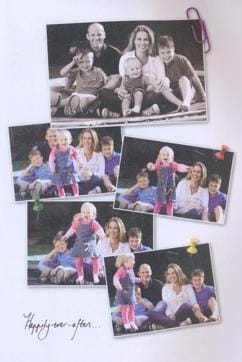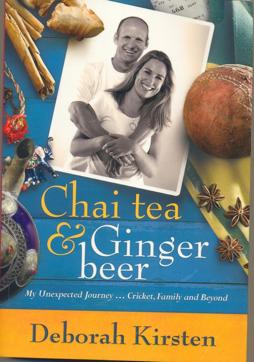Deborah Kirsten’s book promises an insider’s view of the big, bad world of cricketers and their WAGs
The title might bother Indian readers a bit. ‘Chai Tea’. What’s that? Just ‘chai’ would suffice, surely. Over the years, there has been more than a fair share of books and movies, with the outsider’s perspective of India. But it’s not the ‘chai tea’ aspect of Deborah Kirsten’s book, Chai Tea & Ginger Beer that is of so much interest to us. It’s the promise of an insider’s view of the big, bad world of cricketers, and their personal lives.

For, Gary Kirsten, Deborah’s famous husband, wasn’t just a South African opening batsman (with a knack for scoring prolifically against India). Subsequently, he was also the coach of the 2011 World Cup-winning Indian team.
Deborah manages to take the sheen off the apparently glamorous lives of wives and girlfriends (or WAGs, as the infamous coinage goes) of cricketers to some extent. She writes earnestly, and honestly. In a chapter titled ‘A Brave New World’, a photograph is captioned “Apparently this shot is called ‘a drive’…” (the book is peppered with captioned photos).
This is Deborah writing about her first time on tour with Gary, to India, in 1996. She admits to being “painfully green regarding my cricket knowledge” and not yet being initiated into the ‘pack of wives’. Yet, by the time they married, in 1999, Deborah knew she had a lifetime of cricket, sitting in the stands, a lot of travel, and hotel rooms, ahead of her.
A few days back, sitting at the rooftop restaurant of a south Mumbai five-star, and having ordered a cup of tea with milk, appropriately, Deborah admits that back when they first met, “I didn’t see much cricket”. She was working as a waitress in a restaurant in Cape Town. He was already South Africa’s opening batsman.
Except, Deborah had no idea who he was. She says he walked into the restaurant one day and kept “eyeing her”. Gary, sitting next to her now, only puts up a mild protest to suggest things were the other way around, and then lets her go on with the story.

He seems the quieter of the two, showing the calmness of an opening Test batsman. He’s also aware that this is her moment, and he’s there in a supporting role, a reversal of the usual scenario. Yet, a day before this meeting takes place, there’s news that Gary has been approached to take up the coaching job for Team India again.
We leave the question everyone, including the BCCI, wants answered – ‘Will he?’ – for the end. He’s armed with a standard response – ‘Maybe’. Actually, he says, “I’m a cricket coach by profession, and it would be silly for me to not look at it, but I need to see the circumstances,” but this statement effectively translates to ‘maybe’.
Deborah sits quietly as he speaks, aware that the famous husband will always be asked about cricket. It’s something she addresses in the book as well. Right in the beginning, she wonders if her story is “too small” or insignificant compared to that of the “well-known international sportsman”.
What Deborah’s book achieves is, it gives the WAGs (a term she doesn’t like too much; “none of us like to be labelled”) more personality than glamorous faces sitting in the stands, occasionally smiling for the camera. This is as true of cricket, as of other sports.
In the book, she talks about being interrupted on the streets, and turning photographer for eager fans — “The photos did not include me, as I would most often end up being the one behind the camera…” She also talks about travelling with young children, about “damp baby clothes” strung across hotel rooms and “cooking two-minute noodles in the kettle” — the imagery is far from glamourous.
“Hotels had become our homes,” she says of travelling with their three children during Gary’s stint as the Team India coach (2011 to 2013), “And because we were moving so much, I had to homeschool them,” says Deborah. But the hardest part, she says, wasn’t the time on the road, but the time spent apart. She brings up the subject in the book, and the term ‘cricket widow’, often used for wives of cricketers left alone back home.

But Gary, as a player, and as the Indian coach, has always been supportive of having partners on tour. Mention the Virat Kohli-Anushka Sharma criticism during World Cup 2015, and he says, “You need to normalise players’ lives as far as possible. If we don’t travel with our partners, we’ll never get to see them.” Deborah did travel a lot with him, and worked as a freelance food and travel writer to keep things flexible.
She isn’t averse to the idea of doing it again, should Gary say yes to BCCI’s offer. “I love India,” she says with a smile. A line we’re used to hearing, and one we assume she’s used to delivering by now. Yet, she seems to mean it: photos of her shopping at Crawford Market turn up on Twitter; she says she’s made friends with the shopkeepers there. As she has with cricketers and their wives, especially the Dravids — Rahul and Vijeta.
If she’s back, there will be more friends to make (the team has changed a fair bit since), and more to write on. Perhaps it will be the Kohlis. Now, who wouldn’t want to read about that?
Read up
What: Chai Tea and Ginger Beer by Deborah Kirsten is out now
Publisher: Struik Christian Media
Price: Rs 402 on Amazon.in
Gary and Deborah Kirsten were in India courtesy FirstRand Bank, of which Gary is the brand ambassador.





